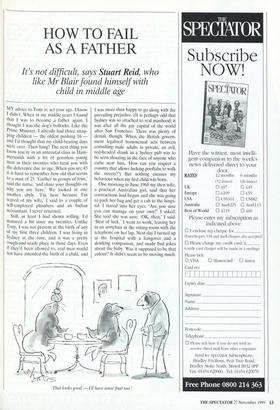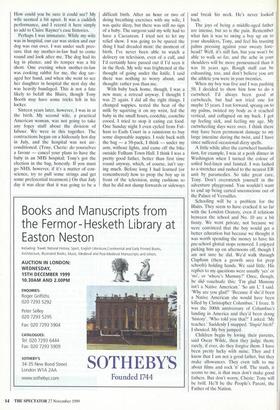HOW TO FAIL AS A FATHER
It's not difficult, says Stuart Reid, who like Mr Blair found himself with child in middle age
MY advice to Tony is: act your age. I know I didn't. When in my middle years I found that I was to become a father again, I thought I was the dog's bollocks. Like the Prime Minister, I already had three strap- ping children — the eldest pushing 16 — and I'd thought that my child-bearing days Were over. Then bang! The next thing you know you're in an antenatal class in Ham- mersmith with a lot of gormless young men in their twenties who treat you with the deference due to age. When you are 45 it is hard to remember how old that seems to a man of 25. 'Gather in groups of four,' said the nurse, 'and share your thoughts on Why you are here.' We looked at one another shyly. 'I'm here because I'm scared of my wife,' I said to a couple of self-employed plumbers and an Indian accountant. I never returned.
Still, at least I had shown willing. I'd matured a bit since my twenties. Unlike Tony, I was not present at the birth of any of my firit three children. I was living in Sydney at the time, and it was a pretty rough-and-ready place in those days. Even if they'd been allowed to, real men would not have attended the birth of a child, and I was more than happy to go along with the prevailing prejudice. (It is perhaps odd that Sydney was so attached to real manhood; it was after all the gay capital of the world after San Francisco. There was plenty of denial, though. When the British govern- ment legalised homosexual acts between consulting male adults in private, an evil, red-headed drunk in a Sydney pub was to be seen shouting in the face of anyone who came near him, 'How can you respect a country that allows fucking pooftahs to walk the streets?') But nothing excuses my behaviour when my first child was born.
One morning in June 1968 my then wife, a practical Australian girl, said that her contractions had begun and she was going to pack her bag and get a cab to the hospi- tal. I stared into her eyes. 'Are you sure you can manage on your own?' I asked. She said she was sure. 'OK, then,' I said. 'Best of luck.' I went to work, leaving her in an armchair in the sitting-room with the telephone on her lap. Next day I turned up at the hospital with a hangover and a drinking companion, and made bad jokes about the baby. Was it supposed to be that colour? It didn't seem to be moving much.
'That looks good — I'll have some fruit too.'
How could you be sure it could see? My wife seemed a bit upset. It was a caddish performance, and I record it here simply to add to Claire Rayner's case histories.
Perhaps I was immature. While my wife was in hospital, our car was stolen and our dog was run over. I was under such pres- sure that my mother-in-law had to come round and look after me. The dog had its leg in plaster, and its temper was a bit short. One evening when mother-in-law was cooking rabbit for me, the dog sav- aged her hand, and when she went to see her daughter in hospital the next day she was heavily bandaged. This is not a fate likely to befall the Blairs, though Tony Booth may have some tricks left in his locker.
Sixteen years later, however, I was in at the birth. My second wife, a practical American woman, was not going to take any fogey stuff about the division of labour. We were in this together. The contractions began on a hideously hot day in July, and the hospital was not air- conditioned. (Tony, Cherie: do yourselves a favour — cancel your plans to have the baby in an NHS hospital; Tony's got the election in the bag, honestly. If you must go NHS, however, if it's a matter of con- science, try to pull some strings and get some preferential treatment.) On that July day it was clear that it was going to be a difficult birth. After an hour or two of doing breathing exercises with my wife, I was quite dizzy, but there was still no sign of a baby. The surgeon said my wife had to have a Caesarean. I tried not to let my relief show. I was going to be spared the thing I had dreaded most: the moment of birth. I've never been able to watch a delivery on television, even of a calf, and I'd certainly have passed out if I'd seen it in the flesh. My wife was frightened at the thought of going under the knife. I said there was nothing to worry about, and thought: rather you than me.
With baby back home, though, I was a new man; a retread anyway. I thought I was 25 again. I did all the right things. I changed nappies, tested the heat of the milk by squirting it on my wrist, fed the baby in the small hours, cootchie, cootchie cooed. I tried to stop it eating cat food. One Sunday night I even cycled from Ful- ham to Earls Court in a rainstorm to buy some disposable nappies. I rode back with the bag — a 50-pack, I think — under my arm, without lights, and came off the bike outside Fulham Town Hall. I think I was a pretty good father, better than first time round anyway, which, of course, isn't say- ing much. Before long I had learned (or remembered) how to prop the boy up in front of the television, using cushions so that he did not slump forwards or sideways and break his neck. He's never looked back.
The joys of being a middle-aged father are intense, but so is the pain. Remember what fun it was to swing a boy up on to your shoulders, Tony, and feel his trusting palms pressing against your sweaty fore- head? Well, it's still fun, but you won't be able to walk so far, and the ache in your shoulders will be more pronounced than it was 16 years ago. Rough stuff can be exhausting, too, and don't believe you are the athlete you were in your twenties.
When my boy was five and I was pushing 50, I decided to show him how to do a cartwheel. I'd always been good at cartwheels, but had not tried one for maybe 15 years. I ran forward, sprang on to my palms, twisted my body as it reached vertical, and collapsed on my back. I got up feeling sick, and feeling my age. My cartwheeling days were over. I think there may have been permanent damage to my large intestine during the twist, and I have since suffered occasional dizzy spells.
A little while after the cartwheel humilia- tion, for example, I was at a posh dinner in Washington when I turned the colour of soiled bed-linen and fainted. I was lashed to a stretcher and rushed to the nearest ER unit by paramedics. So take great care, Tony. Don't overstretch yourself in the adventure playground. You wouldn't want to end up being carted unconscious out of the Palace of Versailles.
Schooling will be a problem for the Blairs. They seem to have cracked it so far with the London Oratory, even if relations between the school and No. 10 are a bit frosty. We went private, not because we were convinced that the boy would get a better education but because we thought it was worth spending the money to have his pre-school glottal stops removed. I enjoyed picking him up on afternoons off, though I am not sure he did. We'd walk through Clapham (then a growth area for prep schools) holding hands. We said little. His replies to my questions were usually 'yes' or 'no', or 'where's Mummy?' Once, though, he did vouchsafe this: 'I'm glad Mummy isn't a Native American.' So am I,' I said. 'Why are you glad?' Because if she'd been a Native American she would have been killed by Christopher Columbus.' I froze. It was the 500th anniversary of Columbus's landing in America and they'd been doing 'history'. 'Who told you that?' I asked. 'My teacher.' Suddenly I snapped. 'Stupid bitch!' I shouted. My boy jumped.
Children begin by loving their parents, said Oscar Wilde, then they judge them; rarely, if ever, do they forgive them. I have been pretty lucky with mine. They and I know that I am not a good father, but they make allowances. They even talk to me about films and rock 'n' roll. The truth, it seems to me, is that men don't make good fathers. But don't worry, Cherie: Tony will be brill. He'll be the People's Parent, the Father of the Nation.



























































































 Previous page
Previous page